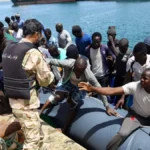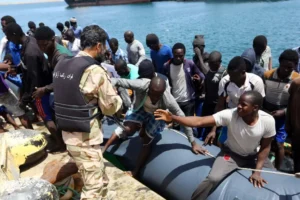The UN has sounded the alarm over a “catastrophic” humanitarian situation in Sudan as paramilitary troops move closer to capturing all of the western region of Darfur, leaving a trail of atrocities in their wake.
In recent weeks, the paramilitary Rapid Support Forces of General Mohamed Hamdan Dagalo, better known as Hemeti, have seized Nyala, Sudan’s second-largest city, and most of the five federal states comprising Darfur. Fierce battles are raging in El Fasher, North Darfur’s capital. The RSF has been battling the Sudanese Armed Forces for control of the country since fighting broke out in mid-April.
The RSF has intensified its focus on Darfur, an ethnically divided region and Hemeti’s historic power base, where bouts of violence have continued since a war that started in 2003. With a ceasefire continuing to be elusive in peace talks mediated by Saudi Arabia and the US, the RSF’s recent gains have heightened fears of the country splitting into two competing areas.
“It’s a catastrophic situation, which is just getting worse and worse,” said Toby Harward, deputy humanitarian co-ordinator for Darfur for the UN’s refugee agency UNHCR. “Hundreds of thousands of civilians and displaced people are now in great danger in El Fasher.” He said the number of people in need of humanitarian assistance in Sudan has topped 25mn — more than half the country’s population.
Urging an “immediate cessation” of attacks in El Fasher, US secretary of state Antony Blinken last week condemned “reported abuses by the RSF and allied forces in connection with their assault on Nyala, including civilian deaths, arbitrary arrests, detention of medical personnel and looting of health facilities”.
Since fighting erupted between forces loyal to de facto president and army chief General Abdel Fattah al-Burhan and Hemeti, more than 10,400 fatalities, mainly in Khartoum and Darfur, have been recorded by the Armed Conflict Location and Event Data Project (ACLED). Sudanese health workers believe the toll to be much higher.
Hemeti, originally from a Chadian Arab clan in North Darfur, was commander of a Janjaweed brigade that terrorised the area while fighting rebels who rose up against the government of former strongman Omar al-Bashir two decades ago in a brutal war that cost about 300,000 lives.
The violence in Sudan has aggravated Darfur’s deep-rooted divisions — especially between Arab Rizeigat and African Masalit ethnic groups — a situation that UN officials said had parallels with the outbreak of inter-ethnic bloodshed in 2003.
“Twenty years ago the world was shocked by the terrible atrocities in Darfur. We fear a similar dynamic might be developing,” said UNHCR head Filippo Grandi on Friday.
This week, following the takeover of an SAF military base in El Geneina in West Darfur, the UN said “Arab militias allied with the RSF” killed civilians in the town’s Ardamata district, adding that fighters targeted the Masalit community. Grandi said that “more than 800 people have been reportedly killed by armed groups in Ardamata”.
The US embassy this week said it was “deeply disturbed” by reports of human rights abuses and ethnic targeting by “the RSF and affiliated militias” in Darfur, while Clementine Nkweta-Salami, the UN secretary-general’s representative in Sudan, said “displacement, disease and sexual violence were rampant” in the country’s seven-month conflict.
An RSF spokesman said this week: “we renew our emphasis on respect for human rights”.
The RSF now controls most of Darfur, a region almost the size of France, and most of Khartoum, although the SAF holds
critical bases and sites in the capital, analysts and humanitarian officials say. This week, local media reported fierce clashes between the warring parties in Khartoum’s twin city, Omdurman. Many government departments have moved to Port Sudan on the Red Sea coast, according to analysts.
The latest round of negotiations in Jeddah between the warring parties ended this week without a ceasefire deal.
“The talks in Jeddah have become cover for the atrocities committed in Darfur by the RSF,” said Kholood Khair, a Sudanese analyst and founding director of Confluence Advisory, a Khartoum think-tank.
“The SAF would likely sacrifice Darfur in order to consolidate power in other regions, hastening the already-unfolding Libya scenario,” she added, referring to Sudan’s north-western neighbour, which is administered by competing governments in the capital Tripoli and the eastern city of Benghazi, each backed by rival militias.
The latter is run by the Libyan National Army of renegade general Khalifa Haftar, considered an ally of Hemeti.
Source: FT











